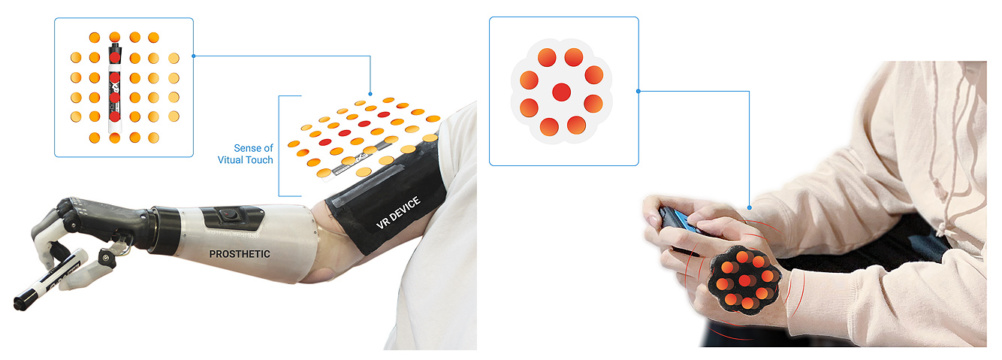The technology could enhance prosthetic and VR technologies
Future virtual and augmented reality systems could also come equipped with the sense of touch thanks to electronic skin technology developed by engineers at the City University of Hong Kong.
The group’s system of so-called “electronic skin-integrated haptic interfaces” can transmit sensory stimuli to the body via the wireless actuator that converts energy to mechanical vibrations.
“Our target is to develop electronic skin that can be comparable to human skin,” said Dr Yu Xinge, the principal author of an article on the research in the journal Nature. “Compared with similar types of equipment on the market, our new system is light and thin that can be tightly attached to human skin. Also, it’s wire-free and battery-free.”
Composed of more than 700 functional components, the system is less than 3mm thick and comprises a number of different layers including a thin elastomeric layer as a reversible, soft adhesive interface to the skin, a silicone encapsulated functional layer that supports a wireless control system and a series of interconnected actuators, and an external layer of breathable fabric, which can be put together with wearable clothes.
“Conventional actuators that provide sensory vibrations require power of about 100 milliwatts to transmit signals. However, as our new system uses radio frequency [RF] for power supply, it needs less than 2 milliwatts to transmit signals and produce the same level of mechanical vibrations. Thus, we solved the difficult problem of transmission by low-power wireless function and significantly increased the distance of the operation for our system. This system not only saves power but also allows users to move more freely without the trouble of wires,” Dr Yu said.
As well as being used to enhance the user experience of VR and AR technologies, the group said that the skin could also help users of prostheses feel the external environment through the sense of touch and provide feedback to the users.
The project team also included academics from the University of Bristol in the UK, Northwestern University, the University of Illinois at Urbana-Champaign and Pennsylvania State University in the US, and Tsinghua University and Shandong University in Chin
Source: Electronic skin promises ultra immersive VR | The Engineer The Engineer













